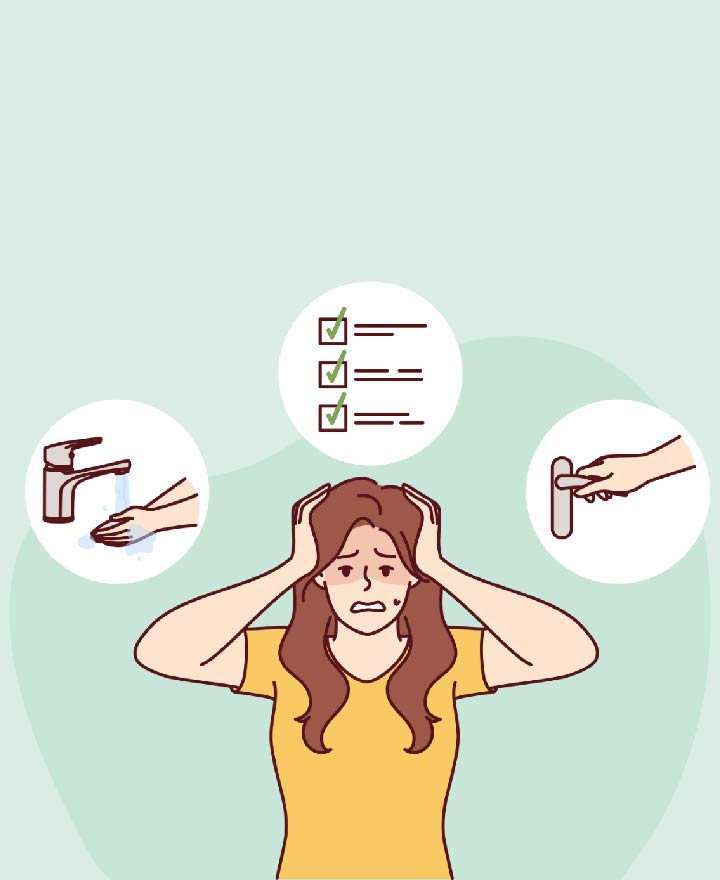

Everything You Need To Know About OCD
Obsessive-compulsive disorder (OCD) is a type of mental health disorder that involves symptoms of obsessions and compulsions. In this article, we’ll take a look at this disorder, what causes it, and how to treat it.
What is OCD?
Obsessive compulsive disorder (OCD), also known as obsessive compulsive neurosis, is a psychiatric disorder that makes people develop thoughts, feelings, ideas, obsessions and repetitive behaviors.
Causes of OCD
While the specific causes are still not known, as per health experts it is caused by certain brain anomalies. Also, factors such as major emotional trauma, history of physical abuse, frequent unpleasant changes in personal and professional life can increase the risk in some cases.
Symptoms of OCD
The most common symptoms are obsessive thoughts which are repetitive and which can also manifest in compulsions. We can classify the obsessions into four categories:
• Interrogative (the need to check some things over and over again)
• Fears or phobias (fears of diseases, certain things, etc.)
• Impulsive (aggressive or sexual)
• Obsessive ideas (need for order, symmetry, religious issues, time issues, etc)
In general, people with OCD may also have ticks. This refers to involuntary movements that come from different muscle contractions in the body.
Diagnosis of OCD
While there are no particular tests available to diagnose OCD, the healthcare provider may run some physical exams and other tests in to verify existence of above mentioned symptoms.
Treatment of OCD
Principally, OCD is treated with cognitive behavioural therapy. In this therapy, the patient is exposed to situations that purposely trigger obsessive thoughts. By doing this, they will start to control their anxiety and their urge to carry out an impulsive act.
In addition, there are also psycho-pharmacological treatments where in the doctor prescribes antidepressants in order to manage the symptoms.
Finally, education about this disorder is provided for patients and their families, as well as training in social skills and activities.
Conclusion
If you feel that you or your loved ones may have OCD then consider seeking help from a mental health professional. A diagnosis of OCD can be scary at first, but it can be managed.
One of the important components of our overall wellness is also being financially secured. Healthcare emergencies can happen any time, but a good health insurance can protect you from such uncertain situations. To know more about it, click here
Source: Healthline, Cleveland Clinic, Webmd, McLean Hospital
Disclaimer: This blog provides general information and discussions about health and related subjects. The information and other content provided in this blog, website or in any linked materials are not intended and should not be considered, or used as a substitute for, medical advice, diagnosis or treatment. Kindly contact your Doctor before starting a new medicine or health regime.
Related Articles
From Listening Music To Practicing Yoga, Here Are 5 Hobbies To Boost Your Mental Health
How Social Media Affects Your Mental Health And Leads To Anxiety
How Does Raising Mental Health Awareness Help
Are Mental Health Issues Covered in Health Insurance?
Things to Know About Mental Health Coverage
Published on January 03, 2023


 Health Insurance
Health Insurance  Travel Insurance
Travel Insurance  Car Insurance
Car Insurance  Cyber Insurance
Cyber Insurance  Critical Illness Insurance
Critical Illness Insurance
 Pet Insurance
Pet Insurance
 Bike/Two Wheeler Insurance
Bike/Two Wheeler Insurance  Home Insurance
Home Insurance  Third Party Vehicle Ins.
Third Party Vehicle Ins.  Tractor Insurance
Tractor Insurance  Goods Carrying Vehicle Ins.
Goods Carrying Vehicle Ins.  Passenger Carrying Vehicle Ins.
Passenger Carrying Vehicle Ins.  Compulsory Personal Accident Insurance
Compulsory Personal Accident Insurance  Travel Insurance
Travel Insurance  Rural
Rural